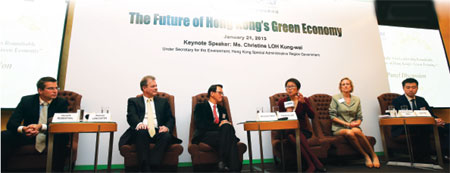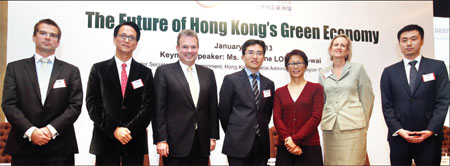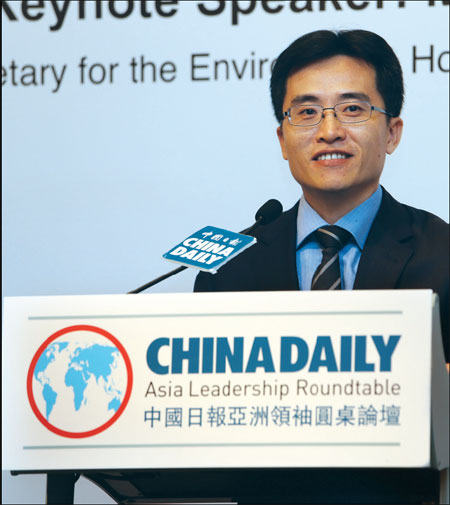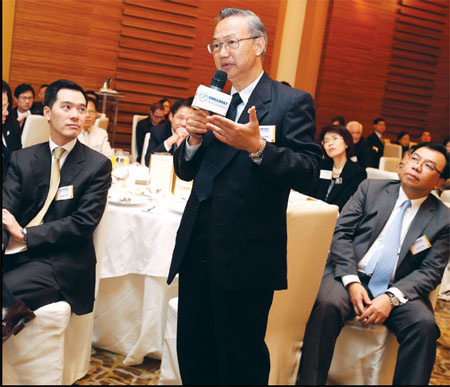Giant steps toward a greener HK economy
Updated: 2013-01-22 07:00
By Alfred Romann(HK Edition)
|
|||||||||
|
Speakers exchange views during the China Daily Asia Leadership Roundtable themed "The Future of Hong Kong's Green Economy" on Monday. Photos by Edmond Tang / China Daily |
|
Speakers and organizers pose for a photo after the roundtable. |
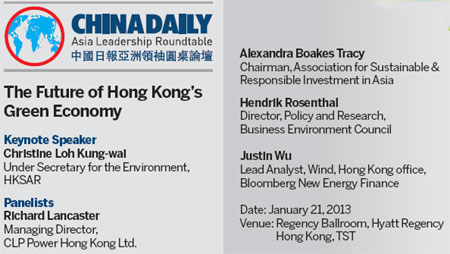
Used glass, very little of which is recycled in Hong Kong, provides a good example of the environmental challenges the government has to tackle.
Recycling glass requires collecting bottles, crushing them and turning them into reusable material such as the stuff used to pave roads. But, because there is very little profit to be made, businesses have shied away from it. Now the government is trying to step up efforts as part of a drive to create a better "recycling loop", said Christine Loh Kung-wai, Hong Kong's Under Secretary for the Environment.
Less than a week after Hong Kong Chief Executive Leung Chun-ying outlined the government's policy initiatives for the year, speakers at a China Daily Asia Leadership Roundtable themed "The Future of Hong Kong's Green Economy" on Monday, said there is a lot of work to do to raise environmental standards and attract business focused on environmental sustainability and green technology.
Lowering emissions and cleaning up the air is only part of the challenges Hong Kong will have to tackle as it focuses on creating a greener economy. The aim of the discussion on Monday was to create a more competitive environment for Hong Kong, said Zhou Li, publisher and editor-in-chief at China Daily Asia Pacific.
"Many cities in the mainland are in the throes of pollution," said Zhou. "Hong Kong may feel a bit luckier this time (but) there are enormous challenges ahead in the long way to make Hong Kong a more livable and healthy city."
Pointing out that Hong Kong is stepping up efforts to clean up its environment to improve public health and generate new business opportunities, Loh said the government's investment commitments and new priorities included building two food waste treatment plants and ramping up recycling.
At the heart of this push for a greener economy and a better environment is a drive to reduce roadside pollution, which made the environmental cornerstone of the policy speech last week. While the negative side effects of pollution are myriad, the impact on public health may be the most serious and hard to control.
"Once you focus on public health you realize how much you have to do to reduce public health risks," said Loh. "The daily exposure to pollution of our people is very, very high."
The government's efforts, outlined in Leung's policy speech on January 16, focuses on lowering emissions from 88,000 vehicles while taking older vehicles off the road. The push is part of an HK$10 billion initiative to retrofit vehicles to meet Euro-III standards or higher. Eventually, the goal is for vehicles to meet standards as high as Euro-V. New vehicles will be given a lifespan of 15 years.
The impact of this push could be significant, said Loh. A pre-Euro standard vehicle generates 35 times as many emissions as one that meets the new standards.
New catalytic converters will also be installed on LPG taxis and minibuses. When dirty, these vehicles also produce a significant amount of pollution.
Low-sulfur fuel law
The government is also driving legislation that would see cargo ships arriving in Hong Kong switch to low-sulfur fuels while berthing. The push comes almost two years after a group of 18 leading container lines signed a voluntary Fair Wind Charter, under which they switch fuels while in port.
"This is the only voluntary scheme in the world in which the industry pays for its own cost of fuel switching," said Loh. "These people are doing it, essentially, at their own cost."
Both the Hong Kong Liner Shipping Association and the Hong Kong Shipowners' Association have been asking government to regulate fuel switching to create an even playing field.
Hong Kong would be the first port in the region to do so and it would be "quite an aggressive move".
"One of the most important things that we are doing is mandating fuel switching at berth," said Loh. "Hopefully we can pass the legislation relatively soon."
Expanding this policy to the whole Pearl River Delta "would be good for the people of the whole region The vision is a low emission area for the whole water of the region."
On-shore power
Another associated initiative would provide on-shore power at the new Kai Tak Cruise Terminal being developed in East Kowloon. The introduction of international standards for on-shore power would facilitate this initiative.
In the last 10 years, more than $1.5 trillion has been spent on green energy projects worldwide, said Justin Wu, lead analyst for Wind at Bloomberg New Energy Finance. Last year alone, investment from both public and private sources on green energy projects was about $270 billion worldwide.
"China is actually the leading country, by far, in clean energy investment at more than 25 percent of the total (at $68 billion)," said Wu, who added that the USA was in the second place, with 50 percent less investment than China.
"I think there is a great level of awareness in Beijing and citizens in China of environmental sustainability," said Wu.
In China, the challenge is finding and transmitting clean energy as the country has limited clean energy resources. Most of China is ill suited to produce much wind or solar energy. On the other hand, production in parts of Western China could supply Guangdong Province with a single transmission line.
Hong Kong also has limited opportunities to generate energy from renewable sources, said Richard Lancaster, managing director at CLP Power Hong Kong. Electricity producer and distributor CLP has been moving away from coal-fired plants in the past two decades but about half of the city's power comes from coal. The other half comes from gas or nuclear power.
"If you go back to the 1990s, almost all of our power came from coal-fired plants," said Lancaster. Today, "we have a relatively clean mix of coal power, gas and nuclear power To do more, we will need to shift further away from coal-fired power."
"In the last 20 years, emissions from power generation have reduced by 80 percent and this is despite the fact that electricity demand has risen by 82 percent," said Lancaster.
But getting sustained environmental improvement is not cheap. It requires a "regular, consistent and a sustained level of investment," Lancaster said. In 2011, CLP spent HK$10 billion to clean up its coal-fired plant in The Peak in Hong Kong and every year the company spends about HK$10 billion in gas to fuel its gas-powered plant.
These are major and long-term investments.
Lowering emissions, whether from vehicles or power generation, is only part of the challenge as there are other environmental problems that Hong Kong has to tackle.
Waste challenge
One of them, which Loh called "enormous", is waste. The city is filling up landfills at a rate of 13,500 tons per day - as much as a third of that is food waste.
"There is quite a lot that we can do food that is not consumed that is still of excellent quality, like the bread rolls, can it be donated?" asked Loh. "It does require all of us to change our habits."
Last year, Hong Kong launched the Food Wise campaign working with business and NGOs.
"We want people who are already leaders in their field to call upon their brothers and sisters in their field, to show them by demonstration how it can be done."
It is not all bad news. While very little food waste is recycled, the city does recycle as much as 48 percent of all waste and the government would like to raise that to 55 percent.
For the time being, Hong Kong does not have a complete waste treatment infrastructure. The total needed spending is HK$31 billion to build the necessary infrastructure.
"We are going to have to build a whole range of hardware to deal with the waste we are not able to reuse or recycle," said Loh. "It is continuous investment. We can't run away from it."
First incinerator
"At the end of the year we will have a first incinerator We, in Hong Kong, need this type of technology to deal with this type of waste."
The city is also centralizing efforts to lower energy consumption through the Steering Committee for the Promotion of Green Building and also working to improve nature conservation.
In order for these initiatives to succeed and provide benefits, both government and private sector have to work together to drive environmental and sustainable investment, said Alexandra Boakes Tracy, chairman of the Association for Sustainable & Responsible Investment in Asia. The association is a grouping of financial institutions and investors that promotes sustainable investment.
Tracy said investors look for reliable and long-term policies. Such policies have already led to the creation of more than 400 funds that invest in clean energy or sustainable technology. Unfortunately, Hong Kong has lagged other jurisdictions in attracting such funds or their investments.
South Korea, an industrial country that imports as much as 97 percent of its energy, may provide some inspiration for useful policies.
"For (South) Korea, there are a lot of reasons why energy efficiency and moving to a green economy (makes sense)," said Tracy. Hong Kong, basically a service economy with limited manufacturing, has an opportunity to be a leader in this area.
"I think some people would say Hong Kong is arguably lagging now on green finance business. Therefore, we should be absolutely building on our strength," said Tracy. "This investment flow will start to become sizeable and Hong Kong has an opportunity to play a role here."
While last week's policy initiatives were generally welcome, many wondered whether they go far enough. Among them is Hendrik Rosenthal, director of policy and research at the Business Environment Council (BEC). He wondered, whether the investment to raise the quality of the emissions control in the city's public transportation fleet would be sufficient to help small businesses deal with the challenges.
"Is it enough? Is it enough for the little guy that is running a one-man shop to feed his family? Is it enough for him to phase out?" asked Rosenthal, talking about the $10 billion that will be spent on upgrading vehicles.
Efforts to clean up vehicles are welcome and rarely controversial, said Rosenthal, as such a move is definitely not as controversial as initiatives to eliminate trash.
"The big elephant in the room is incineration," Rosenthal said. "People want to know how big it is going to be, where it is going to be and all that."
In the end, said Loh, government initiatives along are not enough. It will be up to the community, business and civil society to do their part as well.
"Once you get down to having the policy direction then you have to stitch it all together," said Loh. "How can we find the time to work together to define this path together?" she asked.
|
Zhou Li, publisher and editor-in-chief of China Daily Asia Pacific, delivers his welcome remarks. |
|
Above & Below: Guests raise questions during the Q&A session. |
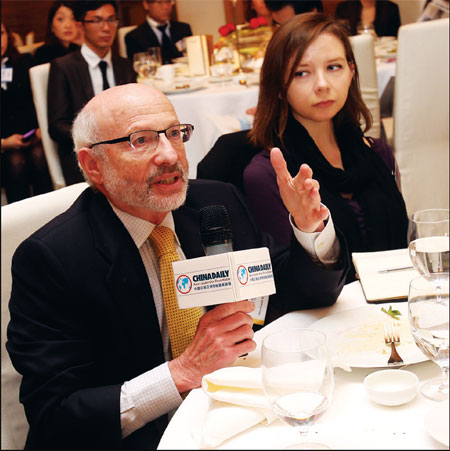
(HK Edition 01/22/2013 page2)
